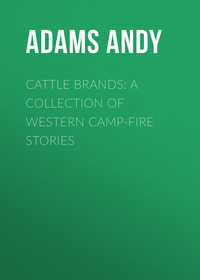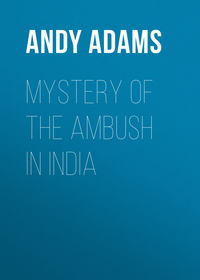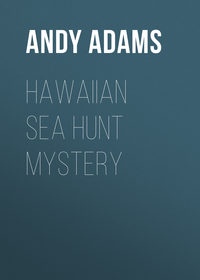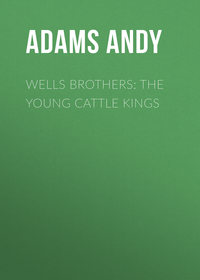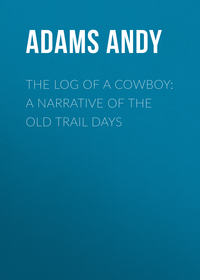 полная версия
полная версияThe Outlet
The buyers were also astir early. I met Mr. Field in the post-office, where he was waiting for it to open. To his general inquiries I reported everything quiet, but suggested we move camp soon or the cattle would become restless. He listened very attentively, and promised that within a few days permission would be given to move out for our final destination. The morning were the quiet hours of the town, and when the buyers had received and gone over their large and accumulated mail, the partners came over to the Dodge House, looking for the fiscal agent, as I supposed, to close the trade on Sponsilier's cattle. Siringo was the acme of indifference, but listened to a different tale. A trusted man, in whom they had placed a great deal of confidence, had failed to materialize. He was then overdue some four or five days, and foul play was suspected. The wily detective poured oil on the troubled waters, assuring them if their man failed to appear within a day or two, he would gladly render every assistance in looking him up. Another matter of considerable moment would be the arrival that morning of a silent partner, the financial man of the firm from Washington, D.C. He was due to arrive on the "Cannon Ball" at eight o'clock, and we all sauntered down to meet the train from the East. On its arrival, Siringo and I stood back among the crowd, but the buyers pushed forward, looking for their friend. The first man to alight from the day coach, coatless and with both eyes blackened, was Archie Tolleston; he almost fell into the arms of our cattle buyers. I recognized Archie at a glance, and dragging the detective inside the waiting-room, posted him as to the arrival with the wild look and blood-shot optics. Siringo cautioned me to go to his room and stay there, promising to report as the day advanced.
Sponsilier had camped the night before on the main river, and as I crossed to the hotel, his commissary pulled up in front of Wright, Beverly & Co.'s outfitting store. Taking the chances of being seen, I interviewed Dave's cook, and learned that his foreman had given him an order for the supplies, and that Sponsilier would not come in until after the herd had passed the Saw Log. As I turned away, my attention was attracted by the deference being shown the financial man of the cattle firm, as the party wended their way around to the Wright House. The silent member of the firm was a portly fellow, and there was no one in the group but did him honor, even the detective carrying a light grip, while Tolleston lumbered along with a heavy one.
My effacement was only temporary, as Siringo appeared at his room shortly afterward. "Well, Quirk," said he, with a smile, "I reckon my work is all done. Field and Radcliff didn't feel like talking business this morning, at least until they had shown the financial member their purchases, both real and prospective. Yes, they took the fat Colonel and Tolleston with them and started for your camp with a two-seated rig. From yours they expect to drive to Forrest's camp, and then meet Sponsilier on the way coming back. No; I declined a very pressing invitation to go along—you see my mixed herds might come in any minute. And say, that man Tolleston was there in a hundred places with the big conversation; he claims to have been kidnapped, and was locked up for the last four days. He says he whipped your man Seay, but couldn't convince the authorities of his innocence until last night, when they set him free. According to his report, Seay's in jail yet at a little town down the road called Kinsley. Now, I'm going to take a conveyance to Spearville, and catch the first train out of there East. Settle my bill with this hotel, and say that I may be out of town for a few days, meeting a herd which I'm expecting. When Tolleston recognizes all three of those outfits as belonging to Don Lovell—well, won't there be hell to pay? Yes, my work is all done."
I fully agreed with the detective that Archie would recognize the remudas and outfits as Lovell's, even though the cattle were road-branded out of the usual "Circle Dot." Siringo further informed me that north of Ford County was all an unorganized country until the Platte River was reached at Ogalalla, and advised me to ignore any legal process served outside those bounds. He was impatient to get away, and when he had put me in possession of everything to our advantage, we wrung each other's hands in farewell. As the drive outlined by the cattle buyers would absorb the day, I felt no necessity of being in a hurry. The absence of Dorg Seay was annoying, and the fellow had done us such valiant service, I felt in honor bound to secure his release. Accordingly I wired the city marshal at Kinsley, and received a reply that Seay had been released early that morning, and had started overland for Dodge. This was fortunate, and after settling all bills, I offered to pay the liveryman in advance for the rig in Seay's possession, assuring him by the telegram that it would return that evening. He refused to make any settlement until the condition of both the animal and the conveyance had been passed upon, and fearful lest Dorg should come back moneyless, I had nothing to do but await his return. I was growing impatient to reach camp, there being no opportunity to send word to my outfit, and the passing hours seemed days, when late in the afternoon Dorg Seay drove down the main street of Dodge as big as a government beef buyer. The liveryman was pleased and accepted the regular rate, and Dorg and I were soon galloping out of town. As we neared the first divide, we dropped our horses into a walk to afford them a breathing spell, and in reply to my fund of information, Seay said:
"So Tolleston's telling that he licked me. Well, that's a good one on this one of old man Seay's boys. Archie must have been crazy with the heat. The fact is that he had been trying to quit me for several days. We had exhausted every line of dissipation, and when I decided that it was no longer possible to hold him, I insulted and provoked him into a quarrel, and we were both arrested. Licked me, did he? He couldn't lick his upper lip."
CHAPTER IX. AT SHERIFF'S CREEK
The sun had nearly set when we galloped into Bob Quirk's camp. Halting only long enough to advise my brother of the escape of Tolleston and his joining the common enemy, I asked him to throw any pursuit off our trail, as I proposed breaking camp that evening. Seay and myself put behind us the few miles between the two wagons, and dashed up to mine just as the outfit were corralling the remuda for night-horses. Orders rang out, and instead of catching our regular guard mounts, the boys picked the best horses in their strings. The cattle were then nearly a mile north of camp, coming in slowly towards the bed-ground, but a half-dozen of us rushed away to relieve the men on herd and turn the beeves back. The work-mules were harnessed in, and as soon as the relieved herders secured mounts, our camp of the past few days was abandoned. The twilight of evening was upon us, and to the rattling of the heavily loaded wagon and the shouting of the wrangler in our rear were added the old herd songs. The cattle, without trail or trace to follow, and fit ransom for a dozen kings in pagan ages, moved north as if imbued with the spirit of the occasion.
A fair moon favored us. The night was an ideal one for work, and about twelve o'clock we bedded down the herd and waited for dawn. As we expected to move again with the first sign of day, no one cared to sleep; our nerves were under a high tension with expectation of what the coming day might bring forth. Our location was an unknown quantity. All agreed that we were fully ten miles north of the Saw Log, and, with the best reasoning at my command, outside the jurisdiction of Ford County. The regular trail leading north was some six or eight miles to the west, and fearful that we had not reached unorganized territory, I was determined to push farther on our course before veering to the left. The night halt, however, afforded us an opportunity to compare notes and arrive at some definite understanding as to the programme of the forthcoming day. "Quirk, you missed the sight of your life," said Jake Blair, as we dismounted around the wagon, after bedding the cattle, "by not being there when the discovery was made that these 'Open A's' were Don Lovell's cattle. Tolleston, of course, made the discovery; but I think he must have smelt the rat in advance. Archie and the buyers arrived for a late dinner, and several times Tolleston ran his eye over one of the boys and asked, 'Haven't I met you somewhere?' but none of them could recall the meeting. Then he got to nosing around the wagon and noticing every horse about camp. The road-brand on the cattle threw him off the scent just for a second, but when he began reading the ranch-brands, he took a new hold. As he looked over the remuda, the scent seemed to get stronger, and when he noticed the 'Circle Dot' on those work-mules, he opened up and bayed as if he had treed something. And sure enough he had; for you know, Tom, those calico lead mules belonged in his team last year, and he swore he'd know them in hell, brand or no brand. When Archie announced the outfit, lock, stock, and barrel, as belonging to Don Lovell, the old buyers turned pale as ghosts, and the fat one took off his hat and fanned himself. That act alone was worth the price of admission. But when we boys were appealed to, we were innocent and likewise ignorant, claiming that we always understood that the herd belonged to the Marshall estate, but then we were just common hands and not supposed to know the facts in the case. Tolleston argued one way, and we all pulled the other, so they drove away, looking as if they hoped it wasn't true. But it was the sight of your life to see that fat fellow fan himself as he kept repeating, 'I thought you boys hurried too much in buying these cattle.'"
The guards changed hourly. No fire was allowed, but Parent set out all the cold food available, and supplementing this with canned goods, we had a midnight lunch. Dorg Seay regaled the outfit with his recent experience, concealing nothing, and regretfully admitting that his charge had escaped before the work was finished. A programme was outlined for the morrow, the main feature of which was that, in case of pursuit, we would all tell the same story. Dawn came between three and four on those June mornings, and with the first streak of gray in the east we divided the outfit and mounted our horses, part riding to push the cattle off their beds and the others to round in the remuda. Before the herd had grazed out a half-mile, we were overtaken by half the outfit on fresh mounts, who at once took charge of the herd. When the relieved men had secured horses, I remained behind and assisted in harnessing in the team and gathering the saddle stock, a number of which were missed for lack of proper light. With the wagon once started, Levering and myself soon had the full remuda in hand and were bringing up the rear in a long, swinging trot. Before the sun peeped over the eastern horizon, we passed the herd and overtook the wagon, which was bumping along over the uneven prairie. Ordering the cook to have breakfast awaiting us beyond a divide which crossed our front, I turned back to the herd, now strung out in regular trailing form. The halt ahead would put us full fifteen miles north of our camp on the Saw Log. An hour later, as we were scaling the divide, one of the point-men sighted a posse in our rear, coming after us like fiends. I was riding in the swing at the time, the herd being strung out fully a mile, and on catching first sight of the pursuers, turned and hurried to the rear. To my agreeable surprise, instead of a sheriff's posse, my brother and five of his men galloped up and overtook us.
"Well, Tom, it's a good thing you moved last night," said Bob, as he reined in his reeking horse. "A deputy sheriff and posse of six men had me under arrest all night, thinking I was the Quirk who had charge of Don Lovell's 'Open A' herd. Yes, they came to my camp about midnight, and I admitted that my name was Quirk and that we were holding Lovell's cattle. They guarded me until morning,—I slept like an innocent babe myself,—when the discovery was made that my herd was in a 'Circle Dot' road-brand instead of an 'Open A,' which their warrant called for. Besides, I proved by fourteen competent witnesses, who had known me for years, that my name was Robert Burns Quirk. My outfit told the posse that the herd they were looking for were camped three miles below, but had left during the afternoon before, and no doubt were then beyond their bailiwick. I gave the posse the horse-laugh, but they all went down the creek, swearing they would trail down that herd of Lovell's. My cattle are going to follow up this morning, so I thought I'd ride on ahead and be your guest in case there is any fun to-day."
The auxiliary was welcomed. The beeves moved on up the divide like veterans assaulting an intrenchment. On reaching a narrow mesa on the summit, a northwest breeze met the leaders, and facing it full in the eye, the herd was allowed to tack westward as they went down the farther slope. This watershed afforded a fine view of the surrounding country, and from its apex I scanned our rear for miles without detecting any sign of animate life. From our elevation, the plain dipped away in every direction. Far to the east, the depression seemed as real as a trough in the ocean when seen from the deck of a ship. The meanderings of this divide were as crooked as a river, and as we surveyed its course one of Bob's men sighted with the naked eye two specks fully five miles distant to the northwest, and evidently in the vicinity of the old trail. The wagon was in plain view, and leaving three of my boys to drift the cattle forward, we rode away with ravenous appetites to interview the cook. Parent maintained his reputation as host, and with a lofty conversation reviewed the legal aspect of the situation confronting us. A hasty breakfast over, my brother asked for mounts for himself and men; and as we were corralling our remuda, one of the three lads on herd signaled to us from the mesa's summit. Catching the nearest horses at hand, and taking our wrangler with us, we cantered up the slope to our waiting sentinel.
"You can't see them now," said Burl Van Vedder, our outlook; "but wait a few minutes and they'll come up on higher ground. Here, here, you are looking a mile too far to the right—they're not following the cattle, but the wagon's trail. Keep your eyes to the left of that shale outcropping, and on a line with that lone tree on the Saw Log. Hold your horses a minute; I've been watching them for half an hour before I called you; be patient, and they'll rise like a trout. There! there comes one on a gray horse. See those two others just behind him. Now, there come the others—six all told." Sure enough, there came the sleuths of deputy sheriffs, trailing up our wagon. They were not over three miles away, and after patiently waiting nearly an hour, we rode to the brink of the slope, and I ordered one of the boys to fire his pistol to attract their attention. On hearing the report, they halted, and taking off my hat I waved them forward. Feeling that we were on safe territory, I was determined to get in the first bluff, and as they rode up, I saluted the leader and said:
"Good-morning, Mr. Sheriff. What are you fooling along on our wagon track for, when you could have trailed the herd in a long lope? Here we've wasted a whole hour waiting for you to come up, just because the sheriff's office of Ford County employs as deputies 'nesters' instead of plainsmen. But now since you are here, let us proceed to business, or would you like to breakfast first? Our wagon is just over the other slope, and you-all look pale around the gills this morning after your long ride and sleepless night. Which shall it be, business or breakfast?"
Haughtily ignoring my irony, the leader of the posse drew from his pocket several papers, and first clearing his throat, said in an imperious tone, "I have a warrant here for the arrest of Tom Quirk, alias McIndoo, and a distress warrant for a herd of 'Open A'—"
"Old sport, you're in the right church, but the wrong pew," I interrupted. "This may be the state of Kansas, but at present we are outside the bailiwick of Ford County, and those papers of yours are useless. Let me take those warrants and I'll indorse them for you, so as to dazzle your superiors on their return without the man or property. I was deputized once by a constable in Texas to assist in recovering some cattle, but just like the present case they got out of our jurisdiction before we overtook them. The constable was a lofty, arrogant fellow like yourself, but had sense enough to keep within his rights. But when it came to indorsing the warrant for return, we were all up a stump, and rode twenty miles out of our way so as to pass Squire Little's ranch and get his advice on the matter. The squire had been a justice in Tennessee before coming to our state, and knew just what to say. Now let me take those papers, and I'll indorse them 'Non est inventus,' which is Latin for SCOOTED, BY GOSH! Ain't you going to let me have them?"
"Now, look here, young man," scornfully replied the chief deputy, "I'll—"
"No, you won't," I again interrupted. "Let me read you a warrant from a higher court. In the name of law, you are willing to prostitute your office to assist a gang of thieves who have taken advantage of an opportunity to ruin my employer, an honest trail drover. The warrant I'm serving was issued by Judge Colt, and it says he is supreme in unorganized territory; that your official authority ceases the moment you step outside your jurisdiction, and you know the Ford County line is behind us. Now, as a citizen, I'll treat you right, but as an official, I won't even listen to you. And what's more, you can't arrest me or any man in my outfit; not that your hair's the wrong color, but because you lack authority. I'm the man you're looking for, and these are Don Lovell's cattle, but you can't touch a hoof of them, not even a stray. Now, if you want to dispute the authority which I've sighted, all you need to do is pull your guns and open your game."
"Mr. Quirk," said the deputy, "you are a fugitive from justice, and I can legally take you wherever I find you. If you resist arrest, all the worse, as it classes you an outlaw. Now, my advice is—"
But the sentence was never finished, for coming down the divide like a hurricane was a band of horsemen, who, on sighting us, raised the long yell, and the next minute Dave Sponsilier and seven of his men dashed up. The boys opened out to avoid the momentum of the onslaught, but the deputies sat firm; and as Sponsilier and his lads threw their horses back on their haunches in halting, Dave stood in his stirrups, and waving his hat shouted, "Hurrah for Don Lovell, and to hell with the sheriff and deputies of Ford County!" Sponsilier and I were great friends, as were likewise our outfits, and we nearly unhorsed each other in our rough but hearty greetings. When quiet was once more restored, Dave continued: "I was in Dodge last night, and Bob Wright put me next that the sheriff was going to take possession of two of old man Don's herds this morning. You can bet your moccasins that the grass didn't grow very much while I was getting back to camp. Flood and The Rebel took fifteen men and went to Quince's support, and I have been scouting since dawn trying to locate you. Yes, the sheriff himself and five deputies passed up the trail before daybreak to arrest Forrest and take possession of his herd—I don't think. I suppose these strangers are deputy sheriffs? If it was me, do you know what I'd do with them?"
The query was half a command. It required no order, for in an instant the deputies were surrounded, and had it not been for the cool judgment of Bob Quirk, violence would have resulted. The primitive mind is slow to resent an affront, and while the chief deputy had couched his last remarks in well-chosen language, his intimation that I was a fugitive from justice, and an outlaw in resisting arrest, was tinder to stubble. Knowing the metal of my outfit, I curbed the tempest within me, and relying on a brother whom I would gladly follow to death if need be, I waved hands off to my boys. "Now, men," said Bob to the deputies, "the easiest way out of this matter is the best. No one here has committed any crime subjecting him to arrest, neither can you take possession of any cattle belonging to Don Lovell. I'll renew the invitation for you to go down to the wagon and breakfast, or I'll give you the best directions at my command to reach Dodge. Instead of trying to attempt to accomplish your object you had better go back to the chaparral—you're spelled down. Take your choice, men."
Bob's words had a soothing effect. He was thirty-three years old and a natural born leader among rough men. His advice carried the steely ring of sincerity, and for the first time since the meeting, the deputies wilted. The chief one called his men aside, and after a brief consultation my brother was invited to join them, which he did. I afterwards learned that Bob went into detail in defining our position in the premises, and the posse, once they heard the other side of the question, took an entirely different view of the matter. While the consultation was in progress, we all dismounted; cigarettes were rolled, and while the smoke arose in clouds, we reviewed the interim since we parted in March in old Medina. The sheriff's posse accompanied my brother to the wagon, and after refreshing themselves, remounted their horses. Bob escorted them back across the summit of the mesa, and the olive branch waved in peace on the divide.
The morning was not far advanced. After a brief consultation, the two older foremen urged that we ride to the relief of Forrest. A hint was sufficient, and including five of my best-mounted men, a posse of twenty of us rode away. We held the divide for some distance on our course, and before we left it, a dust-cloud, indicating the presence of Bob's herd, was sighted on the southern slope, while on the opposite one my cattle were beginning to move forward. Sponsilier knew the probable whereabouts of Forrest, and under his lead we swung into a free gallop as we dropped down the northern slope from the mesa. The pace was carrying us across country at a rate of ten miles an hour, scarcely a word being spoken, as we shook out kink after kink in our horses or reined them in to recover their wind. Our objective point was a slight elevation on the plain, from which we expected to sight the trail if not the herds of Flood, Forrest, and The Rebel. On reaching this gentle swell, we reined in and halted our horses, which were then fuming with healthy sweat. Both creek and trail were clearly outlined before us, but with the heat-waves and mirages beyond, our view was naturally restricted. Sponsilier felt confident that Forrest was north of the creek and beyond the trail, and again shaking out our horses, we silently put the intervening miles behind us. Our mounts were all fresh and strong, and in crossing the creek we allowed them a few swallows of water before continuing our ride. We halted again in crossing the trail, but it was so worn by recent use that it afforded no clue to guide us in our quest. But from the next vantage-point which afforded us a view, a sea of cattle greeted our vision, all of which seemed under herd. Wagon sheets were next sighted, and finally a horseman loomed up and signaled to us. He proved to be one of Flood's men, and under his direction Forrest's camp and cattle were soon located. The lad assured us that a pow-wow had been in session since daybreak, and we hurried away to add our numbers to its council. When we sighted Forrest's wagon among some cottonwoods, a number of men were just mounting to ride away, and before we reached camp, they crossed the creek heading south. A moment later, Forrest walked out, and greeting us, said:
"Hello, fellows. Get down and let your horses blow and enjoy yourselves. You're just a minute late to meet some very nice people. Yes, we had the sheriff from Dodge and a posse of men for breakfast. No—no particular trouble, except John Johns, the d—fool, threw the loop of his rope over the neck of the sheriff's horse, and one of the party offered to unsling a carbine. But about a dozen six-shooters clicked within hearing, and he acted on my advice and cut gun-plays out. No trouble at all except a big medicine talk, and a heap of legal phrases that I don't sabe very clear. Turn your horses loose, I tell you, for I'm going to kill a nice fat stray, and towards evening, when the other herds come up, we'll have a round-up of Don Lovell's outfits. I'll make a little speech, and on account of the bloodless battle this morning, this stream will be rechristened Sheriff's Creek."


